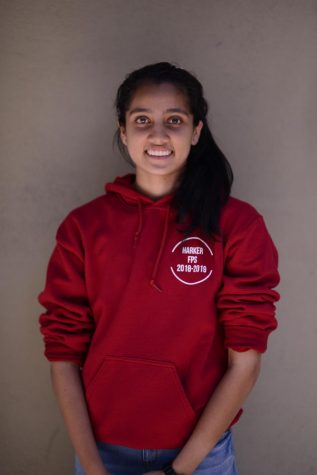Humans of Harker: Sumer Kohli programs with a purpose
“I’ve been working on a compiler for my own programming language, not related to the Harker course, just because I wanted to make my own language as a sort of challenge,” Sumer Kohli (12) said. “I wanted to see if I could make something actually useful. So far it’s called Sumer code, but I’ll come up with a better name, I promise.”
March 22, 2018
Some start with Python; others with Scratch. Some start with robotics, others with online courses and camps. But Sumer Kohli’s (12) programming start came with “The Bros,” the fifth-grade friend group that simply needed some publicity.
“We wanted to make a website for ourselves, and we wanted to showcase how awesome our group was,” Sumer said, laughing. “I don’t know why we did that, but I was somehow elected to make the website and I struggled with making it. The whole reason I even started learning programming at all was simply because I wanted to solve a problem. And I struggled, and over the course of my struggle I picked up a bunch of skills.”
He’s applied that fifth grade mentality — see, solve, explore, repeat — from everything to compilers to drought management.
“In about seventh grade, California was in a drought,” he said. “There was [a lot of] regulations, like ‘water your garden every other day or certain days of the week.’ Our current sprinkler control in my house didn’t support that. So I ended up replacing our sprinkler controller, it took me like a year to finish it all. But I actually bought like a Raspberry Pi and wired it, and I was able to replace our sprinkler controller with my own scheduler and everything.”
It was that project that helped him realize the potential of computer science.
“I just remembered that some of our relatives came over and some friends and my parents showed them the controller, and they were like, ‘Cool, can we have it?’ And before I knew it I actually got in orders for like 10-11 households, and it was pretty cool. One of them actually had a nonprofit, like a senior retirement center and a bunch of locations, and I helped them install it and I thought it was pretty awesome. It started of with something small for our family, and I was able to give it to a bunch of people. I thought it was really cool to know that I can make a difference that in the comfort of my own house sitting on my computer… it showed me how liberating programming is in the sense that no one can put a limit on what you can do. The only limit is of what you think of and how much time you have to do it.”
Eric Tran (12), close friend since second grade summer camp at Harker, described Sumer’s eagerness to help as both a computer scientist and a friend.
“He’s always willing to lend a helping hand no matter what and no matter how busy he might be himself, so I always know I can depend on him for anything, big or small,” Eric said.
While Sumer values algorithms, he focuses more on their application rather than the theory behind them.
“Pure discovery I still think is an awesome thing to do. But unless you have an end goal in mind it just seems very random to me,” he said. “But if everything is directed to a certain goal, then you can invent whatever you need along the way.”
He is currently building a compiler as practice for developing his own original language.
“I’ve been working on a compiler for my own programming language, not related to the Harker course, just because I wanted to make my own language as a sort of challenge,” he said. “I wanted to see if I could make something actually useful. So far it’s called Sumer Code, but I’ll come up with a better name, I promise.”
Consistent with his pragmatic approach to computer science, Sumer is also fascinated by the applicability of economics. His National Economics Challenge team placed fourth in the country.
“I love the idea that you can take all decision-making processes and mathematically figure out what decisions you should make,” he said.
His friend Arindam Ghosh (12) speaks highly of his maturity.
“He doesn’t explicitly talk about his achievements, but you can easily get a sense of his intellect just from the way he talks and comports himself,” Arindam said. “He has quite an active imagination. He frequently comes up with these really odd and funny tangents to conversations. Generally, he is also an organized and professional person, almost to the degree that you would expect of a 30 year old.”
Additional reporting by Humans of Harker Managing Editor Melissa Kwan.


















![“[Building nerf blasters] became this outlet of creativity for me that hasn't been matched by anything else. The process [of] making a build complete to your desire is such a painstakingly difficult process, but I've had to learn from [the skills needed from] soldering to proper painting. There's so many different options for everything, if you think about it, it exists. The best part is [that] if it doesn't exist, you can build it yourself," Ishaan Parate said.](https://harkeraquila.com/wp-content/uploads/2022/08/DSC_8149-900x604.jpg)




![“When I came into high school, I was ready to be a follower. But DECA was a game changer for me. It helped me overcome my fear of public speaking, and it's played such a major role in who I've become today. To be able to successfully lead a chapter of 150 students, an officer team and be one of the upperclassmen I once really admired is something I'm [really] proud of,” Anvitha Tummala ('21) said.](https://harkeraquila.com/wp-content/uploads/2021/07/Screen-Shot-2021-07-25-at-9.50.05-AM-900x594.png)







![“I think getting up in the morning and having a sense of purpose [is exciting]. I think without a certain amount of drive, life is kind of obsolete and mundane, and I think having that every single day is what makes each day unique and kind of makes life exciting,” Neymika Jain (12) said.](https://harkeraquila.com/wp-content/uploads/2017/06/Screen-Shot-2017-06-03-at-4.54.16-PM.png)








![“My slogan is ‘slow feet, don’t eat, and I’m hungry.’ You need to run fast to get where you are–you aren't going to get those championships if you aren't fast,” Angel Cervantes (12) said. “I want to do well in school on my tests and in track and win championships for my team. I live by that, [and] I can do that anywhere: in the classroom or on the field.”](https://harkeraquila.com/wp-content/uploads/2018/06/DSC5146-900x601.jpg)
![“[Volleyball has] taught me how to fall correctly, and another thing it taught is that you don’t have to be the best at something to be good at it. If you just hit the ball in a smart way, then it still scores points and you’re good at it. You could be a background player and still make a much bigger impact on the team than you would think,” Anya Gert (’20) said.](https://harkeraquila.com/wp-content/uploads/2020/06/AnnaGert_JinTuan_HoHPhotoEdited-600x900.jpeg)

![“I'm not nearly there yet, but [my confidence has] definitely been getting better since I was pretty shy and timid coming into Harker my freshman year. I know that there's a lot of people that are really confident in what they do, and I really admire them. Everyone's so driven and that has really pushed me to kind of try to find my own place in high school and be more confident,” Alyssa Huang (’20) said.](https://harkeraquila.com/wp-content/uploads/2020/06/AlyssaHuang_EmilyChen_HoHPhoto-900x749.jpeg)











